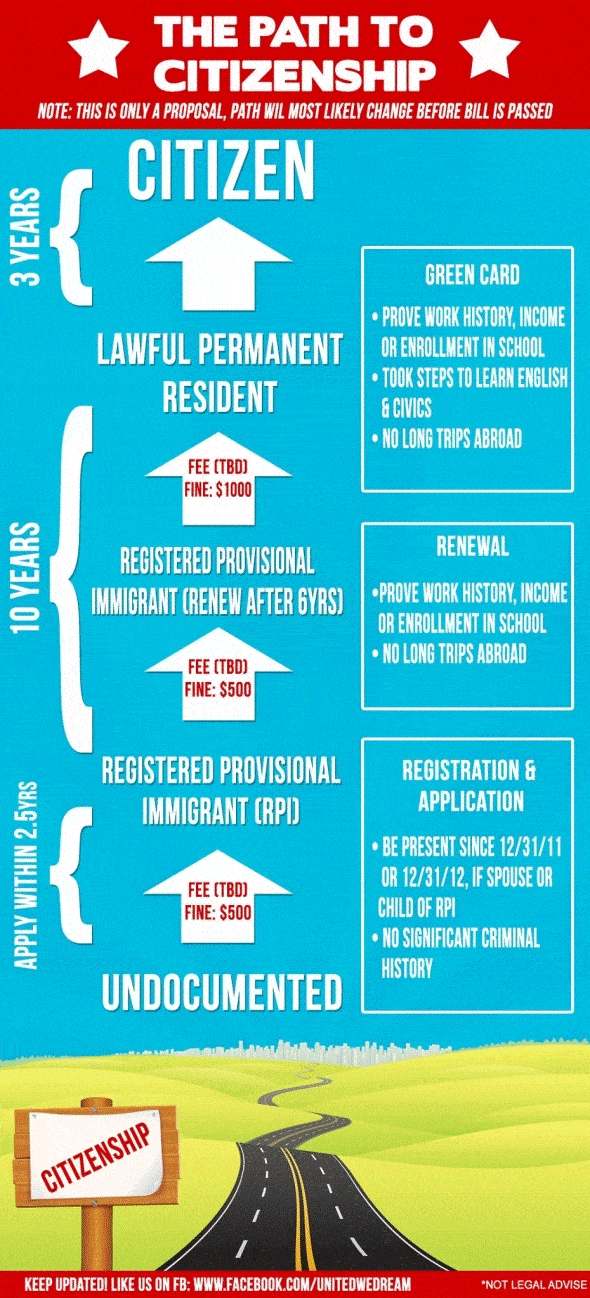
This section provides a path to citizenship for the 11 undocumented immigrants in the United States through the Registered Provisional Immigrant process.
Registration Requirements: Immigrants who entered the United States before December 31, 2011 and have been physically present in the U.S. since that time will be eligible to apply for Registered Provisional Immigrant (RPI) status provided they pass a background check, have not been convicted of a serious crime, pay any assessed tax liability, and pay appropriate fees and a $500 fine. The fee has not been determined yet.
Initial registration will be valid for six years. It provides for work and travel authorization, and includes spouses and children in the United States on the same application.
Renewal: RPIs applying for renewal will be subject to a new background check, payment of processing fees, payment of taxes, and a $500 fine. RPIs must provide evidence of having been 1) regularly employed while meeting a requirement that he/she is not likely to become a public charge or 2) having resources to demonstrate 125% of the poverty level.
Adjustment of Status to Permanent Residency: At the end of ten years, RPIs may apply for adjustment of status, provided that they demonstrate:
- they are admissible,
- pay an additional $1000 fine per adult plus application fees;
- prove they are learning English;
- pay their taxes;
- pass a background check and
- demonstrate compliance with the employment requirement.
Specifically, they must show:
- they have regularly worked in the U.S. such that they are not likely to become a public charge or
- they have resources to meet 125% of the Federal Poverty Level.
Under the revamped legal immigration system, individuals present in the U.S. for 10 years in lawful status can adjust status to lawful permanent residence including RPIs and other legal immigrants. RPIs may apply for naturalization after an additional three year wait, making the total path to citizenship about 13 years. The bill includes a back of the line requirement: RPIs may not adjust status until the family and employment backlogs are cleared.
Timeline: DHS has 12 months to issue regulations. Then there is a one year initial application period which can be extended by the Secretary for up to 18 months.
DREAM Act: Individuals who entered the U.S. before the age of 16 and who have completed high school or obtained a GED in the U.S. may register for RPI status through the DREAM Act. There is no age cap for the program. Individuals who received Deferred Action for Childhood Arrivals are grandfathered into RPI status. DREAM RPIs are exempted from penalties and the triggers. Five years after registration, DREAM RPIs may apply for adjustment of status; their time in RPI status will count towards eligibility for naturalization, allowing them to become citizens immediately after receiving their green card. Children under age 16 have a five year path to citizenship and are exempted from certain requirements. The bill heightens child welfare protections to ensure parental rights are not terminated on the basis of a parent’s immigration status alone.
Agricultural program: Undocumented farm workers who can demonstrate a minimum of 100 work days or 575 hours in the two years prior to the date of enactment would be eligible for an Agricultural Card. Workers who work at least 100 days a year for five years or workers who perform at least 150 days a year for three years can adjust status to permanent residency. To be eligible for permanent residence, agricultural workers must show that they have paid all taxes, have not been convicted of any serious crime, and pay a $400 fine.
Integration: Creates an Office of New Americans, a New Americans taskforce and additional initiatives to help immigrants learn English, American civics and integrate into local communities. Provides funding for programs to help non-profits and local government with these initiatives.



